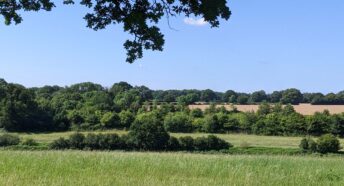Brilliant! CPRE campaign for deposit return scheme is going ahead

CPRE’s campaign for a deposit return scheme on drinks bottles and cans has finally won the day.
Environment secretary Michael Gove announced yesterday (Tuesday, March 27) that we will all pay a deposit of up to 22 pence on plastic and glass bottles, as well as aluminium cans. This deposit can of course be reclaimed.
CPRE has campaigned for the introduction of a deposit return system (DRS) in England for 10 years and is obviously thrilled with Mr Gove’s announcement.
It is a watershed moment for recycling in the UK, given that similar systems around the world produce excellent results.
The decision follows a call for evidence in October last year that investigated how littering with drinks containers could be cut and the recycling of them increased.
The evidence submitted was examined by retail giants such as Coca-Cola and Tesco, alongside other members of the Voluntary and Economic Incentives Working Group, for which CPRE provided the secretariat.
There has been increasing pressure from environmental groups, the media and the public for more action to be taken against the tide of waste polluting our environment, with single-use drinks containers being a huge contributor.
The new DRS for England, which follows the Scottish government’s announcement last year that it would be introducing a similar scheme, will be consulted upon this year. It is not yet apparent whether all retailers of single-use drinks will have to participate.
Samantha Harding, CPRE’s litter programme director, said: “This is a brilliant and significant decision by Michael Gove.
“I am thrilled that we will finally see the many benefits a deposit system will bring to England, not least the absence of ugly drinks containers in our beautiful countryside.
“What’s significant is that producers will now pay the full costs of their packaging, reducing the burden on the taxpayer and setting a strong precedent for other schemes where the polluter pays. This really is a bold and exciting step by the government.”
Bill Bryson, author and former CPRE president, said: “I wholeheartedly congratulate Michael Gove for his wisdom in finally accepting the case for a deposit return system in the UK – I never thought I would see this in my lifetime.
“Future generations will look back on this decision as a piece of supremely enlightened policy-making, and one that raises the prospect of the world’s most beautiful country becoming free from drinks-container litter at last.
“My most profound gratitude goes to the tireless campaigners and heroic litter-pickers of CPRE who, for the past decade, have kept the issue alive in the minds of our politicians, press and public.”
Emma Bridgewater, president of CPRE, added: “This landmark announcement is the breakthrough we have been waiting for.
“CPRE have been campaigning for the introduction of a DRS for almost 10 years – it has been a long battle, but this significant victory is an enormous leap forward in the war against waste.
“Our countryside, oceans and wildlife have long been the victim of our obsession with single-use bottles and cans, with the UK producing billions of them year after year.
“Many end up damaging our natural environments and killing our wildlife – and it is also a shocking waste of valuable materials. The proven success of DRS in other countries means that now most of these bottles and cans will be captured and recycled – we congratulate the government on their decision.”
Wednesday, March 28, 2018
- A number of important documents have yet to emerge. For example, a rigorous transport plan and a finalised air-quality assessment. The latter is critical given that allocations at Teynham will feed extra traffic into AQMAs.
- There seems to be no coherent plan for infrastructure delivery – a key component of the plan given the allocations being proposed near the already crowded Junction 7.
- There seems to have been little or no cooperation with neighbouring boroughs or even parish councils within Swale itself.
The removal of a second consultation might have been understandable if this final version of the plan were similar to that being talked about at the beginning of the consultation process. It is, however, radically different in the following ways:
- There has been a major shift in the balance of housing allocations, away from the west of the borough over to the east, especially around the historic town of Faversham. This is a move that raises many concerns.
- A new large allocation, with accompanying A2 bypass, has appeared around Teynham and Lynsted, to which we are objecting.
- Housing allocations in the AONB around Neames Forstal that were judged “unsuitable” by the council’s own officers have now appeared as part of the housing numbers.
- Most of the housing allocations being proposed are on greenfield sites, many of them on Grade 1 agricultural land – a point to which we are strongly objecting.
Concerns about the rush to submit the plan
The haste with which the plan is being prepared is especially worrying given the concentration of housing in Faversham. If the town is to take a large amount of new housing, it is imperative that the policies concerning the area are carefully worked out to preserve, as far as possible, the unique nature of the town. The rush to submit the plan is likely to prove detrimental.
As Swale does not have a five-year land housing supply, it is open to speculative development proposals, many of which would run counter to the ideas contained in the current plan. Some are already appearing. This is a common situation, and one that, doubtless, is a reason behind Swale’s haste.
Our overriding fear, however, is that this emphasis on haste is ultimately going to prove counterproductive. This is because it is our view that the plan, in its current form, is unlikely to pass independent examination. We are urging Swale to listen to and act upon the comments being made about the plan and to return the plan to the council with appropriate modifications before submitting it to the Secretary of State.
Essentially, this means treating the current consultation not as the final one but as the ‘lost’ second consultation.
The consultation ends on Friday 30 April and we strongly urge residents to make their opinions known if they have not already done so.
Further information








